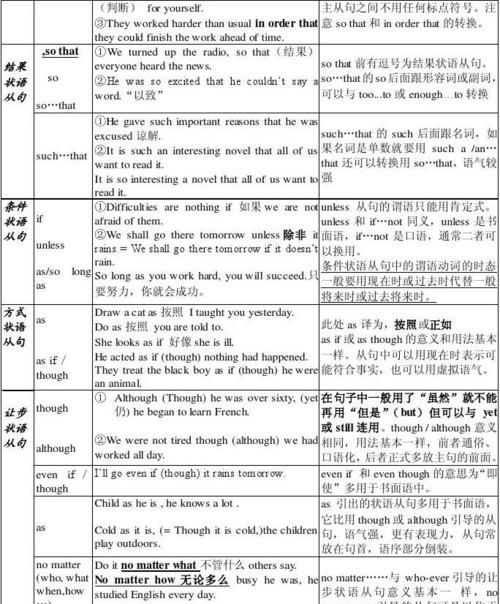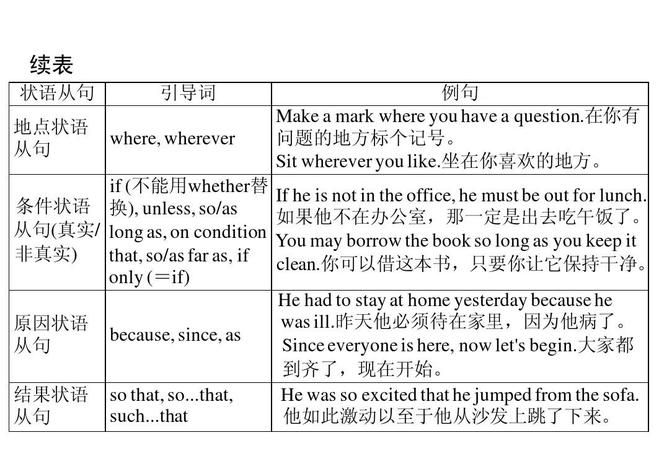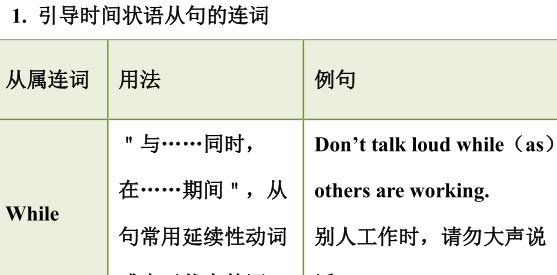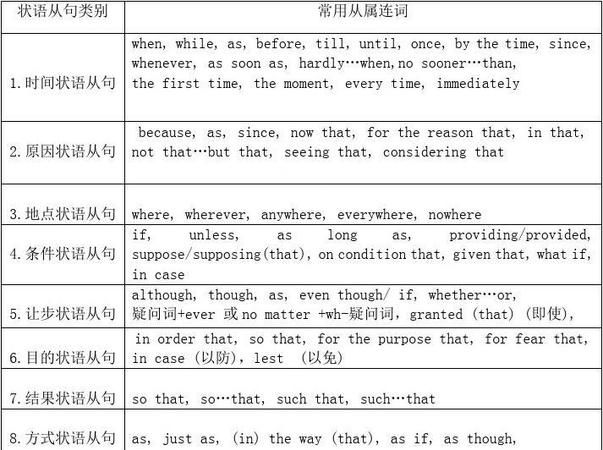本文目录
英语中让步状语从句的定义
让步状语从句
要点:
表示让步的状语从句由连词
though,
although引导.
难点:
lthough,
although当虽然讲,
都不能和but连用.
although,(though)…but的格式是不对的.但是他们都可以同yet
(still)
连用.
所以thought
(although)…yet(still)的格式是正确的.
lwrong:
although
he
is
rich
but
he
is
not
happy.
right
:
although
he
is
rich,
yet
he
is
not
happy.
虽然他很富有,
然而他并不快乐.
lright
:
although
we
have
grown
up,
our
parents
treat
us
as
children.
right
:
although
we
have
grown
up,
our
parents
still
treat
us
as
children.
尽管我们已经长大了,可是我们的父母仍把我们看作小孩.
although,
though
辨析
although
不能though
那样用作副词,
放在句末表示强调时要用even
though.
lhe
is
looking
fit,
though.
但是,他看上去很健康.
考点
leven
though
i
didn’t
under
a
word,
i
kept
smiling.
尽管我一个字也不懂,我还是一直微笑着。
lhe
is
quite
experienced,
he
is
young,
though.
尽管他很年轻,他很有经验。

英语状语从句有哪几种
英语状语从句分8种:
1.时间状语从句(adverbial clauses of time),多由连词引起。
(when,after,before,as,as soon as,as long as,since,whenever,once)
E.g. When we lived in town we often went to the theater.
It was a long time before I got to sleep again.
As the sun rose the fog dispersed(vt. 消散).
少数不由连词引起状语从句。
(now that,every time,each time,the moment,immediately,instantly,directly)
E.g. Directly he uttered(vt. 说出)these words, there eas a dead silence.
I had no sooner checked in the hotel than he arrived.
2.地点状语从句(adverbial clause of place)
(where,wherever,anywhere)
E.g. The church was built where there had once been a roman temple(n.寺庙).
Everywhere I go, I find the same thing.
3.方式状语从句(adverbial clause of manner),一般由as,like,as if引起。
E.g. I am as you can image short of money. 正如你能想象的那样,我很缺钱。
I did as she asked.
Do it as he does.
I feel just like I did when I was a boy.
I remember the whole thing as if it happened yesterday.
He glanced about as if in search of something.
4.原因状语从句(adverbial clause of reason), 一般由because,as,since,in case,还有两个词有相同的意思(seeing,considering)
E.g. He was angry because we were late.
As the soup was very salty, we were thirsty afterwards.
He took a spoonful(n.满满的一勺) and tasted it in case it was hot.
Seeing that it is ten o’clock, we shall not wait for her any longer.
5.条件状语从句,一般由if,unless,supposing, providing,as long as, granted that引起。
E.g. We sat on the grass if it was fine.
If I could afford it, I would buy a boat.
If necessary, ring me at home.
Supposing he can’t come, who will do the work?
6.让步状语从句(adverbial clause of concession),主要由although, though, even though, while,whereas。
E.g. Though we are poor, we are still happy.
Some praise him, whereas others condemn him.
Though not large, the room was well lit.
7.目的状语从句和结果状语从句(adverbial clause of purpose and adverbial clause of result),主要由so that,such that, in order that,otherwise,else.
E.g. Let’s take the front seats that we may see more clearly.
Give me back the money, otherwise I’ll ring the police.
Hurry up or else you’ll be late.(赶快,否则你就会迟到了。)
8.比较状语从句(adverbial clauses of comparison),主要由than ,as 引起。
E.g. You sing better than I do.
I haven’t done as much as I should have liked.(我没做得像我希望的那样好。)

英语中让步状语从句的定义
让步状语从句表示:虽然,尽管,即使等概念,由although, though(尽管,即使),however(无论怎样),whatever(无论什么),whoever(无论谁),whomever(无论谁),whichever(无论哪个),whenever(无论何时),wherever(无论哪里),whether(是否),no matter (who,what,where,when,etc) (无论……),even if(即使),even though(即使)等词引导。
如:We won’t be discouraged even if (=even though) we fail ten times.我们就是失败十次也不泄气。
It was an exciting game,though/although no goals were scored.那是一场精彩的球赛,尽管一个球都没进。(though, although不能与but连用)
Whether you believe it or not,it’s true.不管你信不信,这是真的。
However (=No matter how) expensive it may be,I’ll take it.无论它有多贵,我也要买下它。
Don’t let them in,whoever(=no matter who) they are.不管他们是谁,别让他们进来。
No matter what I say or how I say it,he always thinks I’m wrong.无论我说什么或怎么说,他总认为是我错。
even if 与even though 的区别:
1.even if 与even though 的区别 两者均可用于引导让步状语从句,其细微区别是:
1. even if 引导的从句是往往是假设性的,相当于汉语的“即使”“纵然”“就算”“哪怕”。如:
They’ll stand by you even if you don’t succeed. 即使你不成功,他们也会支持你。
Even if I have to walk all the way I’ll get there. 即使我得一路走着去,我也要走到那里。
Even if it rains tomorrow, we won’t change our plan. 即使明天下雨,我们也决不改变计划。
For my part, I plan to go to the party even if you decide not to go. 至于我,即使你决定不去参加晚会我也会去的。
Even if you saw him pick up the money, you can’t be sure he stole it. 就算你看见是他拾起的钱,你也不能肯定钱就是他偷的。
正因为even if从句的内容通常是假设性的,所以有时还可用于虚拟语气;这样用的even if 与单独使用的if比较接近。如:
Even if he had the money, he wouldn’t buy it. 他即使有钱也不会买它。
I would have married her even if she had been penniless. 即使她身无分文,我也会和她结婚。
2.even though 引导的从句内容往往是真实的,主要用于引出不利用于主句情况的信息,相当于汉语的“尽管”“虽然”。如:
He went out even though it was raining. 尽管在下雨,他还是出去了。
Even though it’s hard work, I enjoy it. 虽然工作艰苦,我还是很喜欢。
He’s the best teacher even though he has the least experience. 他尽管经验最少,但教得最好。
Even though I didn’t know anybody at the party, I had a nice time. 尽管这次聚会上我谁也不认识,我也玩得挺痛快。
这样用的even though与though或although的意思比较接近,许多时候可以互换(注意:英语可以说though和even though,但不能说even although)。如:
Even though [Thought, Although] I felt sorry for him, l was secretly pleased tha t he was having difficulties. 虽然我为他感到惋惜,但对他的困难却暗自高兴。
Even though [Thought, Although] we all tried our best, we lost the game. 虽然我们已尽了最大的力量,但还是输了。
3.不过,在实际语言运用中,even if与even though有时也可不加区别地混用。如:
Even if [Even though] she laughs at him, he likes her. 尽管她嘲笑他,他还是很喜欢她。
We thoroughly understand each other, even if [even though] we don’t always agree. 我们彼此非常了解,虽然有时候也有一些分歧。
4.no matter
what(who,which,when,etc.)与whatever(whoever,whichever,whenever,etc.)的区别:
当引导引导让步状语从句时,两者相同,可以互换(what=the thing, whatever = anyting),但当引导名词性从句(主语从句,宾语从句,表语从句和同位语从句)时则只能用whatever(whoever,whichever,whenever,etc)。如上面最后两个例句可改为:
However pure the water looks,I do not want to drink it.
I want to marry the man I love,no matter who he may be.
下面句子不能用no matter结构(no matter不能引导名词性从句):
Whoever comes back first is supposed to win the prize.(主语从句)
I am ready to do whatever you want me to .(宾语从句)
例证:
Whatever you did,I will accept.为让步状语从句.
I will accept whatever you did.为宾语从句.
5.as 引导让步状语从句的用法
引导让步状语从句时,as意为“虽然,尽管”,通常从句要倒装,倒装的方法是将从句的表语或状语放在as之前,而用though引导让步状语从句时句字则不必倒装(口语中也可倒装)。
e.g. Heavily as it was raining outside,they started out very early.
Young as he is,he knows a lot=Though he is young 或Young though he is,he….
他虽然年轻,但懂得很多。(though 也有这种用法,可以替换as,但although没有这种用法)
注意,名词提句首时,不加冠词:
e.g:teacher as he is,he likes Chinese very much(teacher 前不加a或the)。
though还可以用作副词,放在句末。如:
It was a hard work, I enjoyed it, though=It was a hard work,but I enjoyed it.那工作很苦,但是我喜欢干。
6.用though/although, as 引导让步状语从句时,句中不能用but表示转折语气。
不能说:Though he looks weak,but he is healthy.
而要说:Though he looks weak,he is healthy.
或者说:He looks weak,but he is healthy.
我自己认为让步就是存在一定条件下的说法.
though和although引导让步状语从句时,不可以与but连用。汉语中用"虽然……但是……”,但英语中只用though,although或but即可。
although/though he is very old, he still works very hard.=(he is very old, he still works very hard)虽然他老了,但他仍然很努力地工作。不可说:although/though he is very old, but he still works very hard。
though和although可以与yet连用。此处yet虽与but同义,但它不是连词,而是副词。
though l knew the fact,yet l didnt say anything。尽管我知道,但我什么都没说。
7.however 用作副词,不可连接句子。但可置于第二句的句首、句末或句中。要特别注意标点的使用。
eg: Alice is a good student.However, she has one shortcoming.爱丽丝是一个很好的学生,但她仍有缺点。He has not arrived. He may, however, come later. The composition is all right. There is room for improvement,however.
8.除以上提到的从句连词外,表示让步的介词短语有despite, in spite of,后接名词。eg. Despite all these facts, we cannot ignore the advantages of learning through internet.

高中英语状语从句教案
高中英语状语从句用法解析
一、 定义:
在句中作状语的从句是状语从句,修饰主句中的动词、形容词或副词等。状语从句由从属连词引导,从属连词在句中不充当句子成分,只起连接作用,状语从句放在句首时,要用逗号,放在句尾时不用。
二、 分类
根据意义上的不同,状语从句可分为:①时间状语从句 ②地点状语从句 ③原因状语从句④目的状语从句 ⑤条件状语从句 ⑥结果状语从句⑦让步状语从句 ⑧方式状语从句 ⑨比较状语从句三、 时间状语从句主句是一般将来时,时间状语从句用一般现在时表将来;主句是过去将来时,从句用一般过去时表示过去将来时;主句是一般过去时,从句用一般过去时。记忆:“主将从现”
(一)引导时间状语从句的连词有:As, when (whenever), before, after, as soon as, until (till), since, every time, once.
(二)、 具体应用1)“while” 主、从句动作或状态同时发生。用while引导的从句用延续性动词,常表示较长的时间或一个过程。记忆:While 后用进行时。While we were having supper, all the lights went out.
Please keep quiet while others are studying.
While I was writing letters last night, he was watching TV. 2)When表示“就在……的时候”, while意为反而,可是,表示转折。One evening Beethoven was walking in a street, when he suddenly stopped outside a little house.
3) Whenever 无论什么时候,随时
1. Whenever someone throws in some rubbish, the truck produces a piece of music.
每当有人扔进一些垃圾时,它(汽车)就放一段音乐。
2. Whenever we’re in trouble, they will help us.
3. I go to the theatre, whenever I am free.
4. Come and see me whenever you want to.你随时来看我。
4) till和until(表示“直到……”)句首多用until
1、在肯定句中表示“直到……为止”,主句谓语动词要用延续性动词。
I was waiting until/till he arrived.
2、在否定句中表示“直到……才”主句谓语动词常用终止性动词,这时until和till常被before替换。
I didn' t leave till/until she came back.
5) since: 主句用完成时,从句用一般过去时,since引导的从句间或可用现在完成时。
It is two years since I have studied English.
1. We have known each other since we were children.
2. We have been friends (ever since) since we met at school.
3. It is …… (一段时间)+since+一般过去时态句子。
It is two years since my sister married.
……(一段时间) have/has passed since +一般过去时态句子
Two sisters have/has passed since my sister married.
Since+时间点
1. I have been at home since three o' clock this afternoon.
2. Maria has been in China since two years ago.
6)Every time, each time, next time
Every time you get back at night, you drop your boots on the floor.
Every time I catch cold, I have pain in my back.
Next time I go there, I will visit them.
7)once 一旦…就
Once you begin, you must go on. 你一开了头,就应该继续下去。
四、 地点状语从句
地点状语从句用where, wherever引导
We should go where the people need us.我们应该去人民需要我们的地方。
Where there is a will, there is a way. 有志者,事竟成。
Wherever they went, they received a worm welcome.
无论他们走到哪儿都受到热烈欢迎。
She follow him whose he goes. 他无论到哪里她总跟着。
五、 原因状语从句
原因状语从句用because(因为),since(既然), as(由于)引导1、 字母由多到少,语气由强到弱。
2、 由why提问必须用because回答。
Since, as不回答why的提问,而且从句一般放在句首,because一般放在主句之后。
3、 before of +名词
Because of the rain, we didn' t go to the park.
4、 because 和so不可连用,只能选其一。(另有although, but)
Why didn' t he come to school? Because he was ill.
Since I must die, I must. 既然我一定要死,我一定这样做。
Since a lot of people make mistakes in life, Mr Smith wanted to give John a Chance.
5、 for并列连词,不能放在句首,主要放在两个并列句之间。For所提供的理由为一个补充说明,而且前面常有逗号隔开。
The days we short, for it is December now.
六、 目的状语从句
目的状语从句用so(常用于口语), that, so that, in order that引导
目的状语从句的谓语常含有may, might, can, could, should, would等情态动词。
1. We'll sit never to the front so we can hear well.
2. He studied hard so that he might succeed.
3. I'll speak slowly so that you can take notes.
4. They hurried to the station in order that they could catch the train.
5. I took a taxi so that I could get there earlier.
6. I’m going to the lecture early so that I may get a good seat.
七、 条件状语从句
条件状语从句由if, unless, (so) as long as(只需)引导
在条件状语从句中要用一般时表示将来时(与时间状语从句相同)
We will miss the train if you don' t hurry.
He said we would miss the train if we didn't hurry.
You will fail the exam unless you study hard.
= (if you don’t study hard)
He won’t come unless he is invited.
= (if he isn't invited)
Eat less food unless you want to become fatter.
= (if you don’t want to become better)
As long as you are not afraid of difficulties, you are sure to succeed.
As long as you don't lose heart, you will succeed.
八、 结果状语从句
结果状语从句由such…that, so….that, so that, that 引导
1. Such… that 的常用句型
such +a/an +形容词+可数名词单数+that
such +形容词+可数名词单数+that
Such+形容词+可数名词复数(不可数名词)+that
注意so many (much, few, little) +名词,such a lot of (或lots of)+名词是惯用法,不可乱用。
She is such a beautiful girl that we all like her.
They were such beautiful flower that we bought home.
It was such delicious food that they ate it up.
2. so+形容词或副词+that
so+形容词+a/an+可数名词单数+that
He is so rich that he can buy lot of things for himself.
He works so hard that he did everything well.
It was so hot a day that we all went swimming.
It was such a good day that we all went swimming.
3.so that, that都可以引导结果状语从句
He didn't study hard, (so) that he failed the exam.
4. Too…to, enough…to 可以引导结果状语从句与so…that 替换,so…that结构可以用too…to替换必须具备两个条件,一是主句和结果状语从句的主语必须一致,二是从句中的谓语部分必须含有can (could) not.
She is young that she can’t go to school.
She is too young to go to school.
She isn't old enough to go to school.
九、 让步状语从句
although, though
even though = even if, whether…or
however = no matter how
whatever = no matter what
whoever = no matter who
whenever = no matter when
wherever = no matter where
*although和though都表示“虽然”只是although 更正式,多用于句首,而though用于句中,二者都可与yet, still连用,但不与but连用
Although/Though they are poor, they often help others.
They are poor, but they often help others.
Although he has failed many times, he doesn' t give up trying.
Whatever/No matter what you say, I won' t believe you.
No matter what you say, I don' t care.
No matter who you are, you must obey the rules of our school.
However hard he tried, he failed again.
No matter what the weather is like, you can always find surfers out riding the waves.
十、 方式状语从句
方式状语从句由as(如同,按照),as if (though)引导
*as和like都有“像”的意思,as是连词,后面连接句子,like是介词后面可加名词、代词或名词性短语。
I did the work as others did. 相当于 I did like others.
You must do as I do.
as if(though)两者意义相同,从句谓语动词常用虚拟语气,但实现可能性较大,则用连接词。
It seems as if/though it’s going to rain.
They are talking as if/though they were old friends.
She treats me as if I were her brother.
When you are in home,do as the Romans do.
例 You must do ______ I told you.
A. after B. before C. where D. as (D)
The students must do ______ the teacher told them.
A. as B. before C. after D. if (A)
十一、比较状语从句
比较状语从句由as…as, not as(so)…as, than, the+比较级,the+比较级引导
He swims as well as you. (do)
He doesn' t swim as well as you (do).
He got here earlier than you. (did)
The busier he is, the happier he feels. 英语语法状语从句类型综述状语从句主要用来修饰主句或主句的谓语。一般可分为九大类,分别表示时间、地点、原因、目的、结果、条件、让步、比较和方式。尽管种类较多,但由于状语从句与汉语结构和用法相似,所以理解和掌握它并不难。状语从句的关键是要掌握引导不同状语从句的常用连接词和特殊的连接词即考点。现分别列举如下:
1.时间状语从句
常用引导词:when, as, while, as soon as, while, before, after, since , till, until 特殊引导词:the minute, the moment, the second, every time, the day,the instant, immediately , directly, no sooner … than, hardly …when, scarcely … when I didn’t realize how special my mother was until I became an adult.
While John was watching TV, his wife was cooking.
The children ran away from the orchard(果园) the moment they saw the guard.
No sooner had I arrived home than it began to rain.
Every time I listen to your advice, I get into trouble. 2.地点状语从句 常用引导词:where 特殊引导词:wherever, anywhere, everywhere Generally, air will be heavily polluted where there are factories.
Wherever you go, you should work hard. 3.原因状语从句 常用引导词:because, since, as, since 特殊引导词:seeing that, now that, in that, considering that, given that, considering that, inasmuch as, insomuch as My friends dislike me because I’m handsome and successful.
Now that everybody has come, let’s begin our conference.
The higher income tax is harmful in that it may discourage people from trying to earn more.
Considering that he is no more than 12 years old, his height of 1.80 m is quite remarkable. 4.目的状语从句 常用引导词:so that, in order that 特殊引导词:lest, in case, for fear that,in the hope that, for the purpose that, to the end that The boss asked the secretary to hurry up with the letters so that he could sign them.
The teacher raised his voice on purpose that the students in the back could hear more clearly. 5.结果状语从句 常用引导词:so … that, so… that, such … that,
特殊引导词:such that, to the degree that, to the extent that, to such a degree that, He got up so early that he caught the first bus.
It’s such a good chance that we must not miss it.
To such an degree was he excited that he couldn’t sleep last night. 6.条件状语从句 常用引导词:if, unless,
特殊引导词:as/so long as, only if, providing/provided that, suppose that, in case that, on condition that We’ll start our project if the president agrees.
You will certainly succeed so long as you keep on trying.
Provided that there is no opposition, we shall hold the meeting here. 7.让步状语从句 常用引导词:though, although, even if, even though 特殊引导词: as(用在让步状语从句中必须要倒装),while ( 一般用在句首 ),no matter …, in spite of the fact that, while, whatever, whoever, wherever, whenever, however, whichever Much as I respect him, I can’t agree to his proposal.
尽管我很尊敬他,我却不同意他的建议。
The old man always enjoys swimming even though the weather is rough.
No matter how hard he tried, she could not change her mind.
He won’t listen whatever you may say.
8.比较状语从句 常用引导词:as(同级比较), than(不同程度的比较) 特殊引导词:the more … the more … ; just as …, so…; A is to B what /as X is to Y; no … more than; not A so much as B
She is as bad-tempered as her mother.
The house is three times as big as ours.
The more you exercise, the healthier you will be.
Food is to men what oil is to machine. 食物之于人,犹如油之于机器。 9.方式状语从句 常用引导词:as, as if, how
特殊引导词:the way
When in Rome, do as the Roman do.
She behaved as if she were the boss.
Sometimes we teach our children the way our parents have taught us. 英语语法状语从句
希望采纳,谢谢!

以上就是关于英语中九大状语从句,英语中让步状语从句的定义的全部内容,以及英语中九大状语从句 的相关内容,希望能够帮到您。

